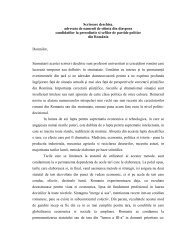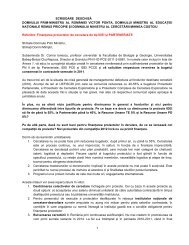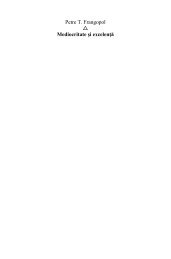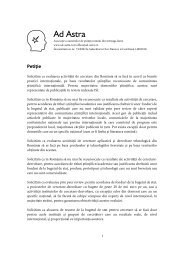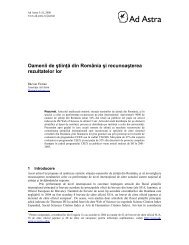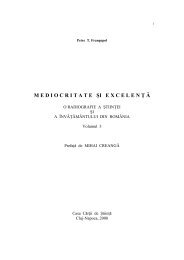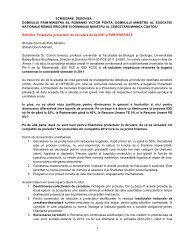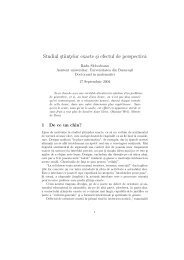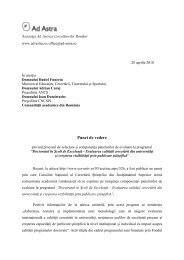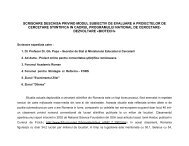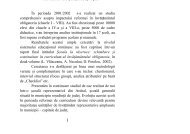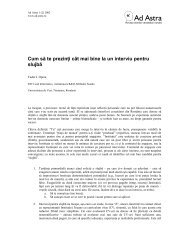PDF (35 K). In English. - Ad Astra
PDF (35 K). In English. - Ad Astra
PDF (35 K). In English. - Ad Astra
Create successful ePaper yourself
Turn your PDF publications into a flip-book with our unique Google optimized e-Paper software.
<strong>Ad</strong> <strong>Astra</strong> 1 (1) 2002<br />
www.ad-astra.ro<br />
“Ecole Normale Supérieure” in Romania?<br />
A dialogue with Andrei Moroianu (project manager)<br />
<strong>Ad</strong> <strong>Astra</strong><br />
Young Romanian Scientists’ Journal<br />
Liviu Giosan: Andrei, SNS is a major initiative for science education in Romania. As far as I know, only<br />
New Europe College founded by Andrei Plesu that covers Humanities, has adopted as generous goals as<br />
SNS for the young generation of Romanian intellectuals. It must have been a lot of work to develop a new<br />
institution!<br />
Could you tell me in short the story of how SNS came to be first imagined, and then to exist? Who were<br />
your main colleagues in this enterprise?<br />
Andrei Moroianu: The idea of creating an educational framework to support young Romanian students<br />
and intellectuals based on the ENS model has been first put forward by <strong>Ad</strong>rian Papahagi in 1996. <strong>In</strong> spite<br />
of the moral support that this project gathered from the Romanian diaspora, it never materialized, probably<br />
because nobody was ready then to dedicate enough time and resources to such an enterprise.<br />
Later on, by the end of 1999, I had a discussion with Nicusor Dan in Paris, on the migration of young<br />
Romanian students during their first college years to western universities, never to return. We decided to<br />
tackle this situation, and this is how the SNS project was born. Joined by Sergiu Moroianu some weeks<br />
later, we wrote down the details of the project that we subsequently posted on a dedicated web page<br />
(http://snsb.online.fr). Then, we asked distinguished Romanian scientists as well as some foreign<br />
personalities to establish a Scientific Council for SNS. With only one exception, all of them accepted.<br />
The results of the fund-raising campaign we run afterwards could have been a lot better, if not for an<br />
omnipotent bureaucracy that we faced in Romania. People and institutions abroad naturally have less<br />
interest in supporting such projects. Nevertheless, this year we started the activity of one department of the<br />
SNS, thanks to some private donations and a generous support of the Theta Foundation, and we will do our<br />
best to raise more funds for opening new departments in 2002.<br />
Let me point out that Nicusor Dan and Sergiu Moroianu, who are my main partners in this project, received<br />
their PhD abroad (at the ENS and MIT respectively) and came back to Romania after graduation,<br />
convinced that there is still some hope to re-establish our old scientific traditions.<br />
L.G.: It has been the sheer determination of a small group of people that pushed the SNS project forward.<br />
How did you manage to dedicate time to this and do research or study in the same time?<br />
How should the Romanian Education Ministry for example have helped when presented with such an<br />
initiative? <strong>In</strong> a country with serious problems in research and education such as Romania, one would<br />
expect that the authorities would have better received your enthusiasm and expertise.
2 <strong>Ad</strong> <strong>Astra</strong><br />
For anybody to follow in your footsteps in trying to set up a project in Romania, do you have any advice to<br />
give?<br />
A.M.: You have touched a sensitive point here! The truth is that we spent much more time with this<br />
project than originally planed and - here I have to speak for myself - my research slowed down during this<br />
period. Nevertheless, I consider that all of us have a duty toward the country where we are born in and<br />
where we received our education. <strong>In</strong> this context, I especially feel responsible for the fate of the emerging<br />
generation of Romanian intellectuals.<br />
Now let me tell you about our relationship with the Government: Mr. Andrei Marga, former Minister of<br />
Education, showed himself enthusiastic about the project and promised to finance a big part of it. Some<br />
days later, though, he called us and said that it is much more difficult than he imagined to finance such a<br />
project because it does not fit in any existing framework of the Ministry. You could say, of course, that he<br />
should have created a commission to work on this, but the elections approached, and he probably knew that<br />
his days in that Ministry were counted...<br />
We were disappointed by the lack of interest of the Government in our project, but we do not blame it.<br />
This practically meant that we had to find other solutions. This is actually the advice that I give to anybody<br />
trying to develop projects in Romania: try to be constructive and avoid by all means criticizing. If you do<br />
not adopt this kind of attitude your chances of success are very small in a country plagued by so many<br />
dysfunctions.<br />
L.G.: And, I should add, ask for help immediately after general elections .<br />
Andrei, what can you tell us about the first admission examination at SNS, about the exam itself, about<br />
those who applied, and about the young mathematicians that were in the end admitted? I am looking more<br />
for a personal perspective on these matters rather than an official one (I urge the reader to check the SNS<br />
web page at http://snsb.online.fr where there is a wealth of information about SNS).<br />
A.M.: Due to financial uncertainties, the decision to organize an admission competition in 2001 was taken<br />
very late - in July - when college students were already away for the summer. As a consequence, we had<br />
only a small number of applications, but the positive point was that all candidates were well prepared.<br />
The exam consisted in a written part followed by an oral exam in front of the admission committee<br />
(President: Gheorghe Nenciu, senior researcher, IMAR; Members: Vasile Brinzanescu, Mihnea Coltoiu,<br />
Sergiu Moroianu, senior researchers, IMAR, and Henri Moscovici, Professor, Ohio State University.). <strong>In</strong><br />
spite of the fact that we did not organize a full examination - see the web page for the admission procedure<br />
next year - the topics covered a large spectrum and allowed for a good assessment of the candidates’<br />
potential.<br />
I do not know personally the awardees but I am fully convinced that, because they passed this tough exam,<br />
the Mathematics department of SNS has started on the right track. A sine qua non condition for the success<br />
of our initiative is a massive student enrollment in the yearly SNS competitions. I would like to take this<br />
opportunity to strongly encourage all interested students to apply for admission next year.<br />
L.G.: Romanian institutions are not particularly known for their transparency. <strong>In</strong> research, they fear open<br />
competition and therefore remain parochial. This is well illustrated by the insignificance of Romanian<br />
contributions in the mainstream scientific literature. Some say that this state of facts is due to the lack of<br />
credentials of those who do science and educate. It may be unfair to say this about Mathematics, which<br />
remains the standard-bearer for Romanian science. But SNS plans to extend its activity to other areas.<br />
For example in order to prevent inbreeding, do you plan to include Romanian exiles and/or foreign<br />
personalities in the admission committees next year? Are the foreign members of the Council fully involved<br />
in setting SNS’s policies? How do you plan to integrate the Romanian scientific exile in the education<br />
process at SNS, and is there any practical way that this could be achieved?
“Ecole Normale Supérieure” in Romania? 3<br />
A.M.: I must stress that your analysis does not apply to Mathematics, where Romania holds one of the top<br />
positions on the international scene. But you are certainly right that other scientific fields, which are more<br />
or less dependent on expensive equipment and materials, are under-represented. This is actually one of our<br />
goals: to help provide a favorable environment for raising the level in other scientific areas. I believe that<br />
Romania has the human potential for doing this.<br />
Answering the second part of your question, I have to point out that more than half of the scientific<br />
committee at SNS consists of foreign scientific personalities and Romanians from the diaspora. They are<br />
fully involved in all decisions taken by the committee, through a system of electronic communication and<br />
vote. It is in our plans to periodically organize meetings of the scientific committee in Romania, but we do<br />
not have the financial possibilities yet.<br />
As far as the admission process is concerned, we already included one member of the Romanian exile in<br />
the committee this year, and we intend to strengthen this involvement of the diaspora in the future. We<br />
would like to address our sincere thanks to Professor Moscovici – as well as to all other members of the<br />
admission committee - who accepted to perform this activity without any financial compensation.<br />
L.G.: Do you find that an electronic journal, such as <strong>Ad</strong> <strong>Astra</strong>, that addresses concerns of the Romanian<br />
scientific community, with a particular emphasis on its younger segment, is needed? And finally, do you<br />
believe that <strong>Ad</strong> <strong>Astra</strong> could help SNS?<br />
A.M.: More and more Romanians emigrated in the last decade, most of them young intellectuals. Whereas<br />
this phenomenon certainly has a negative impact in Romania, this could be offset if the émigrés will<br />
continue to keep active professional contacts in their home country. To this end, I consider that your<br />
journal satisfies a natural need for efficient communication within the young Romanian diaspora as well as<br />
between the diaspora and the home country.<br />
<strong>In</strong> any case, I am sure that <strong>Ad</strong> <strong>Astra</strong> can help with the SNS project, especially by providing additional<br />
publicity to the project. I hope that we will bolster our cooperation in the future.<br />
Congratulations for your initiative and I wish you success!



